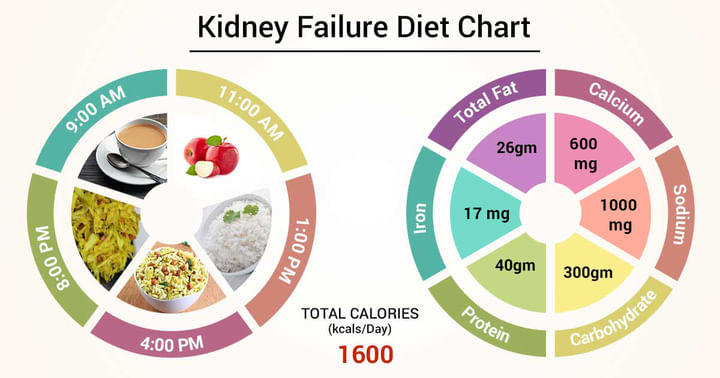Diet Chart For kidney failure
Last Updated: Jan 20, 2025
About
Kidney is one of the most important organ in our body that helps purify our blood and flush out the toxins. A kidney failure leads to serious problems. In the initial stages, medication and diet may be a solution. However, as the condition worsens, it becomes important to seek serious medical advice and may involve taking dialysis or kidney replacement.
Water is an important factor in any diet. In the initial stages, there is no restriction as to the water intake. However, as the condition worsens, one is advised to limit consumption of water because it may lead to shortness of breath.
It is the need of the hour to avoid salty food to prevent thirst. Blood pressure is to be kept under control by reducing sodium intake. Many salt companies, etc. Have come with no sodium or sodium less products.
Potassium levels help maintain the balance in our body. Therefore, potassium rich food like broccoli, lettuce and avocado must be taken. Many people suffering from kidney failure succumb to anemia. To stay careful about it one must consciously take in the right amount of iron. Kale, beef, ect. Are rich sources of iron.
Right type and quantity of protein is to be consumed. Protein produces waste which is digested by the kidneys. Therefore, depending on the type of kidney failure, one is always advised to follow the doctor’s recommendation on the right amount of protein. Dairy products are to be avoided on this note.
Diet also includes foods that are to be avoided. Carbonated juices, alcohol, smoking and processed food must be avoided. Follow this diet for fast recovery from kidney failure. Diet always compliments medication to give the best results.
Diet Chart
| Sunday | |
| Breakfast (8:00-8:30AM) | 1 cup Vangibath+1 cup toned milk/ 1 cup tea (100ml) |
| Mid-Meal (11:00-11:30AM) | 1 apple (100gm) |
| Lunch (2:00-2:30PM) | 1 cup rice+2 chapathi+1/2 cup snake gourd dal(red gram dal leached in hot water for 2 hours)+1/2 cup cabbage(leached) sabji+ 1/2 cup curd |
| Evening (4:00-4:30PM) | 1 cup puffed rice (murmura)+ 1 cup toned milk/tea (100ml) |
| Dinner (8:00-8:30PM) | 1 cup rice+1/2 cup cabbage(leached) sabji |
| Monday | |
| Breakfast (8:00-8:30AM) | 1 cup capsicum rice+1 cup toned milk/ 1 cup tea (100ml) |
| Mid-Meal (11:00-11:30AM) | 1 pear (100gm) |
| Lunch (2:00-2:30PM) | 1.5 cup rice+1/2 cup lauki dal(red gram dal leached)+1/2 cup bhindi(leached) sabji+ 1/2 cup curd |
| Evening (4:00-4:30PM) | 1 cup toned milk/tea (100ml)+ 4 biscuits |
| Dinner (8:00-8:30PM) | 1 cup rice+ 1/2 cup bhindi(leached) sabji |
| Tuesday | |
| Breakfast (8:00-8:30AM) | 3 rice dosa+1/2 cup sambhar(100ml)(red gram dal-leached, onion, ladies finger, bottle gourd)+1tsp tomato chutney+1 cup toned milk/ 1 cup tea (100ml) |
| Mid-Meal (11:00-11:30AM) | 4 Jambu fruits/ strawberries(small) |
| Lunch (2:00-2:30PM) | 1 cup rice+2 chapathi+1/2 cup mix veg sambhar(leached (red gram dal,ladies finger, bottle gourd), onion)+ 1/2 cup lauki sabji+ 1/2 cup curd |
| Evening (4:00-4:30PM) | 3 Cracker biscuits+ 1 cup toned milk/tea (100ml) |
| Dinner (8:00-8:30PM) | 1 cup rice+ 1/2 cup lauki sabji |
| Wednesday | |
| Breakfast (8:00-8:30AM) | 4 rice Idly+ 1/2 cup sambhar (100ml)(red gram dal-leached, onion, ladies finger, bottle gourd)+1 tsp methi chutney+1 cup toned milk/ 1 cup tea (100ml) |
| Mid-Meal (11:00-11:30AM) | Pineapple (100gm) |
| Lunch (2:00-2:30PM) | 1 cup rice+2 chapathi+1/2 cup ridge gourd sabji+1/2 cup methi dal(both methi and red gram dal leached)+ 1/2 cup curd |
| Evening (4:00-4:30PM) | 1 cup toned milk/tea (100ml)+ 4 biscuits |
| Dinner (8:00-8:30PM) | 1 cup rice+1/2 cup ridge gourd sabji |
| Thursday | |
| Breakfast (8:00-8:30AM) | 1 cup vermicelli upma+1 cup toned milk/1 cup tea(100ml) |
| Mid-Meal (11:00-11:30AM) | Musk melon (100gm) |
| Lunch (2:00-2:30PM) | 1.5 cup rice+ 1/2 cup capsicum(leached) sabji+ 1/2 cup ridge gourd dal(red gram dal leached)+ 1/2 cup curd |
| Evening (4:00-4:30PM) | 1 cup poha (rice flakes)+ 1 cup toned milk/tea (100ml) |
| Dinner (8:00-8:30PM) | 1 cup rice+ 1/2 cup capsicum(leached) sabji |
| Friday | |
| Breakfast (8:00-8:30AM) | 3 chapathi+ capsicum curry-1/2 cup+1 cup toned milk/ 1 cup tea (100ml) |
| Mid-Meal (11:00-11:30AM) | papaya (100gm) |
| Lunch (2:00-2:30PM) | 1 cup rice+2 chapathi+brinjal(leached) sabji+1/2 cup tomato dal(green gram dal leached)+ 1/2 cup curd |
| Evening (4:00-4:30PM) | 1 cup toned milk/tea (100ml)+ 4 biscuits |
| Dinner (8:00-8:30PM) | 1 cup rice+ brinjal(leached) sabji |
| Saturday | |
| Breakfast (8:00-8:30AM) | 1 cup tomato rice + methi chutney- 2 tsp+1 cup toned milk/ 1 cup tea (100ml) |
| Mid-Meal (11:00-11:30AM) | 1 small wedge(100gm) watermelon |
| Lunch (2:00-2:30PM) | 1.5 cup rice+1/2 cup mix veg sambhar (leached(red gram dal),ridge gourd, snake gourd,bottle gourd)+1/2 cup ivy gourd(parmal) sabji+ 1/2 cup curd |
| Evening (4:00-4:30PM) | 1 cup toned milk/tea (100ml)+ 4 biscuits |
| Dinner (8:00-8:30PM) | 1 cup rice+ 1/2 cup ivy gourd sabji |
Food Items To Limit
- Sodium is a mineral found in salt (sodium chloride), and it is widely used in food preparation. Salt is one of the most commonly used seasonings, and it takes time to get used to reducing the salt in your diet. However, reducing salt/sodium is an important tool in controlling your kidney disease. Potassium is a mineral involved in how muscles work. When kidneys do not function properly, potassium builds up in the blood. This can cause changes in how the heart beats, possibly even leading to a heart attack. Potassium is found mainly in fruits and vegetables (avocados, dried fruits (including raisins, apricots and prunes), potatoes, oranges, bananas and salt substitutes); plus milk and meats. You will need to avoid certain ones and limit the amount of others.
- Phosphorus is another mineral that can build up in your blood when your kidneys don’t work properly. When this happens, calcium can be pulled from your bones and can collect in your skin or blood vessels. Bone disease can then become a problem, making you more likely to have a bone break. Foods containing phosphorus are Seeds (Pumpkin & Squash), Cheese (Romano), Fish (Salmon), Shellfish (Scallops), Nuts (Brazil), Pork (Lean Sirloin), Beef & Veal (Lean Beef), Low Fat Dairy (Nonfat Yogurt), Soya Foods (Tofu), Beans & Lentils (Lentils) and carbonated beverages.
- Protein-found in meats, fish, poultry, dairy products, nuts and some grains helps your body form muscle and tissue. But when your kidneys are not working well, the byproducts of protein breakdown can build up in your blood. This can make your kidneys work harder.
Do's And Dont's
Do's:
- Limit your fluid intake (including drinking water and other liquids in diet) as per the dietitian's/ doctor's advice.
- Do use foods high in potassium( green leafy vegetables/ pulses) after leaching process.
- Keep a diary for the foods that can be consumed, avoided and limited.
Don'ts:
- Avoid sodium rich foods, processed, canned foods, foods containing preservatives.
- Avoid foods rich in phosphorus (all protein foods are rich in phosphorus) such as meat, chicken, legumes and pulses, dairy products, nuts and carbonated beverages.
- Avoid high potassium foods that can not be leached such as banana, mango, coconut water, avocado, potatoes(white &sweet), yoghurt, whole milk, pumpkin, beans, fish, tomato sauce, beet root, chillies)
- Avoid sugary foods, sweets and other snacks that contain high amounts of sodium and potassium.
- Over consumption of liquids has to be avoided as that might lead to high blood pressure. general liquid intake is 800ml-1000ml/day.
Food Items You Can Easily Consume
- Cereals & cereal products- white rice, wheat products.
- Legumes & Pulses- Arhar daal, toor daal, chickpeas, bengal gram daal (leached)
- Fruits & Vegetables- papaya, pineapple, peach, berries, white jamun, apple, guava, all gourds except bitter gourd, leached green leafy vegetables.
References
- Gretz N, Korb E, Strauch M. Low-protein diet supplemented by keto acids in chronic renal failure: a prospective controlled study. Kidney international. Supplement. 1983 Dec;16:S263-7. [Cited 30 June 2019]. Available from:
- Kopple JD. Nutritional therapy in kidney failure. Nutrition reviews. 1981. Food and Agriculture Organisation of the United Nations [Internet]. agris.fao.org [Cited 30 June 2019]. Available from:
- Fouque D, Laville M, Boissel JP. Low protein diets for chronic kidney disease in non diabetic adults. Cochrane database of systematic reviews. 2006(2). [Cited 30 June 2019]. Available from:
Table of content
Find Dietitian/Nutritionist near me
Ask a free question
Get FREE multiple opinions from Doctors



